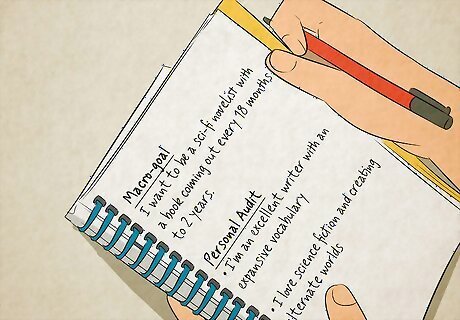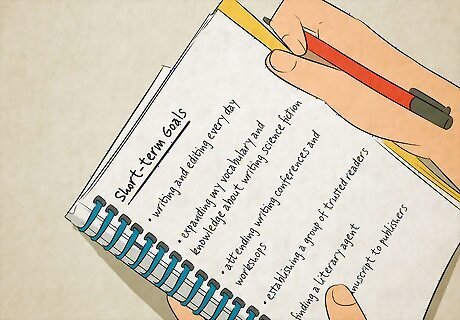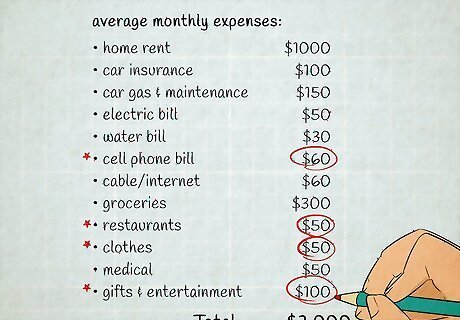
views
- Plan out realistic short- and long-term goals and record your progress in a journal. Stay focused on the future, but celebrate your small victories along the way.
- Try to center your life around your passion—something you're good at which gives you a sense of meaning and purpose.
- Make a clear plan, but be flexible: you can plan for the future, but you can’t predict it. Think of your plan as a skeleton rather than a fully fleshed-out form.
Defining Your Future Goals

Find a place where you can think without being disturbed. Planning for the future requires careful thought and reflection to figure out what you really want. Find somewhere you can be alone and undistracted while you contemplate your future. Being in a quiet place will also help you think for yourself without being influenced by others’ opinions.

Envision your dream future. When you imagine your ideal future, what do you see? Maybe your goal is to own a home, have a family, thrive in a certain career field, or move to a specific place. Maybe it’s all of these or none of these. Defining what you want as best as you can will help you begin to build a plan for your future. Ask yourself what you want, and not what others want for you. You may already know or suspect that your parents, teachers, or society expect certain things from you, but when you picture your dream future, what do you see? This is all that matters.

Consider what you need to do to achieve this future. Examine your present against your ideal future: where do the 2 line up? What about your present do you need to change to achieve your goals? What small changes could you reasonably make today to move closer to that ideal future? Asking questions like these can help make your thoughts more concrete and less dreamy or abstract. Some questions may be hard to answer, but remember that difficult questions tend to be the most important ones. Writing your answers down in a journal or on your computer will help you solidify your plans and view them more realistically. It’s easier to follow through on your plans when your goals and the steps you need to take are clearly defined and in front of you.

Focus on the present and future rather than the past. Dwelling on things past can hinder you as you attempt to move forward. So leave the past where it belongs: in the past. Take advantage of the energy of the present to propel you into your ideal future. Dwelling on past failures can not only distract you from the future, it can make you feel as if you’re not able or worthy of achieving your dreams. You are! Treat your past failures as lessons on what to do in the future so you don’t make the same mistakes, and don’t beat yourself up about things that you can’t change. If you feel like your goals for the future don’t align with what you’ve done already in your life, don’t let this stop you from pursuing those goals anyway! You’re not tethered to your past, and the future isn’t written in stone.
Following Your Passion

Identify your passion by observing what brings you joy and meaning. Figuring out your passion can seem daunting, but it’s usually something you’re naturally drawn to, excited by, or skilled at—something that aligns with your values and makes you feel like you’re making a difference in the world. If you’re not sure what it is right off the bat, consider your life so far: what jobs or activities have you participated in that gave you a sense of meaning and purpose? What did those jobs or activities have in common? That’s likely to be your passion. Think about what you can turn into work that doesn’t necessarily feel like work. Passion and success are highly intertwined. It is the one thing that can give you that natural enthusiasm and set you on a trajectory to happiness and success.

Pursue what you’re good at (and take pride in it). Often, passion and talent go hand in hand. Is there something you’re exceptionally gifted at? If you enjoy it, even if it doesn’t seem like something that’ll make money, throw yourself into it. Believe in your talents and they’ll take you far. Confidence and passion work in tandem to better your chances of succeeding through the thing you love to do most. Finding the intersection of what you love and what you're good at almost always leads to living a fulfilling life. Give some serious thought to the things you enjoy doing, but don't be afraid to try new things through your job, hobbies, or personal life! Being enthusiastic and proud of what you can do or create will give you the momentum to keep going, to keep pursuing your dreams. If you don’t believe in yourself or if you don’t pursue something you’re truly passionate about, you’ll be more likely to slow down or quit when faced with an obstacle. Others will notice your confidence. It's one thing to turn a passion into work, but when you emanate a pride that is unique to you and your work, others might see this and offer you great opportunities.

Trust your instincts to guide you. Following your passion is like walking with the wind at your back: it guides you forward. [[Follow-Your-Intuition}Trust the instincts]] that come with following your passion. They’ll keep you from being too easily swayed by what others have to say, and they can play a great role in your quest for success. On the other hand, pursuing a particular career or lifestyle because you think it’s what you should be doing is like swimming against the current. It goes against your instincts and is therefore much harder to navigate. Gigi Hadid Gigi Hadid, Model & Fashion Influencer Be open to opportunities. "I've learned that if I only put my mind to one thing that I can get tunnel vision. Then I may not be as open to other opportunities because I'm so focused on one thing. I think what's worked better for me personally is I have three goals every day: be nice, work hard, and make friends."
Maintaining Motivation

Plan out your short- and long-term goals in a journal. Long-term goals might be goals you're unlikely to accomplish within the next 10, 20, or more years, like owning a home or retiring. Rather than shoot directly for your long-term goals, identify short-term goals you must achieve as stepping stones towards your big goals. Write this all in your journal, and try to stick to the plan. Keeping track of your progress in a journal can make sure you’re on the right path. Having things laid out on paper can also put things into perspective: are your goals specific enough? Are they too specific? Are they realistic? Maybe you want to be working in a certain company by the time you’re 30. Maybe you want to have your first solo art show by 25 or own a home by 35. Record your goals, and then create “checkpoint” goals to achieve along the way—like connecting the dots. For example, before getting a solo art show, you might need to create a larger body of artwork, connect with a few local curators and gallerists, and participate in several group shows. To buy a house by 35, you might aim to make a certain amount of money by 25 and 30 to be sure you can afford your mortgage by 35. You may also want to establish yourself in a certain career field for at least a couple of years to ensure you get the best home loan you can.

Diverge from your path as needed. Plan out your next steps, but don’t be afraid to stray from the plan if new opportunities arise or if you begin to feel differently about the path you’re on. You can always readjust the path as needed to reflect new goals and dreams. You might have planned to work your way through a few small-time jobs on your way to your dream career in your hometown—only to receive an unexpected lucrative job offer in another country. This might not have been anywhere near your radar, but why not take an adventure? As you grow older and get further into a specific career, you might realize you actually want to pursue an entirely different field. That’s OK! Don’t be afraid to make a change.

Keep your goals listed somewhere visible. It may help you to be able to see your goals whenever you leave or enter your home, or even when you get in or out of your bed. Seeing these goals every day will keep you focused on the plan. Pin your professional to-do list to your fridge, or hang a photo of the place you hope to land a job on your bedroom mirror. Having visual, tangible reminders will help you remember that what you are doing is important.

Celebrate your achievements! Future planning isn’t just about making sure you’re on the right path, it’s also about acknowledging your victories along the way, even if they seem small. So don’t downplay your wins—small goals add up to big successes! To maintain motivation, celebrate when you reach a new benchmark: did you land that low-paying job that could be a stepping stone to your dream career? Go out to dinner with your friends or take a weekend trip to bask in the glory of your achievement. It’s imperative to keep your eyes on the prize, but as they say, it’s not (only) about the destination—it’s about the journey. Besides, if you fail to recognize your small victories, you’re likely to get burned out quickly, or be disillusioned when you finally do achieve your dream life.
Setting Things in Motion

Open a savings account and slowly build it up. Put a little bit of your monthly income away each month. If you can, try to deposit 20% of your monthly income into your savings account. This might not be feasible as you work your way up to a high-paying job, but try to deposit as much as you can each month. The more you can save, the better off you’ll be in the long run.

Cut back on your spending where you’re able. Consider your immediate financial goals (paying rent and utilities, buying groceries, building up an emergency savings stash, etc.), your mid-term goals (moving, buying a car or house, etc.), and your long-term goals (retirement) to figure out how much you need to save each month. Where can you trim the fat on your current spending to save more money? Do you need to live alone in a 2-bedroom apartment, or could you make due with a cheaper studio or a roommate? Maybe it’s not necessary to see 2 concerts in 1 month—buy tickets to one of them and tuck the rest of your money away for the future. Cutting out unnecessary spending can make a huge difference to your future. It all boils down to you learning how to spend wiser. It may mean adjusting a lot of things in your life, but it will be worth it one day.

Follow your plan—but keep an open mind. Remember that the plan you make isn’t a concrete one. Try to stick as closely to your plan as possible, but leave yourself some wiggle room: you can plan for the future, but you can’t control it, and things may not go according to your schedule—you may even change your mind about what you want down the road, and that’s OK! Think of your plan as a skeleton: you can build onto it, but you won’t know exactly how it’s going to turn out from the start. Follow your dreams—but be open to new possibilities.
















Comments
0 comment